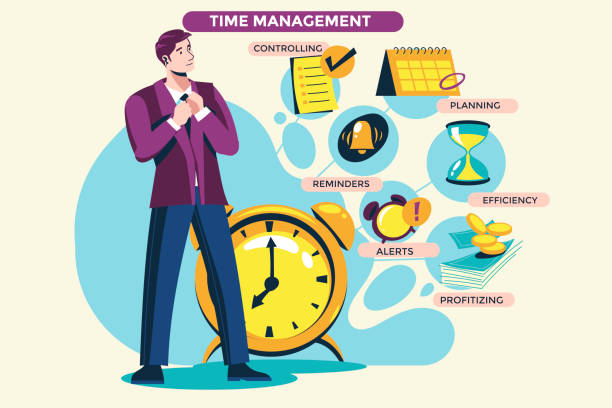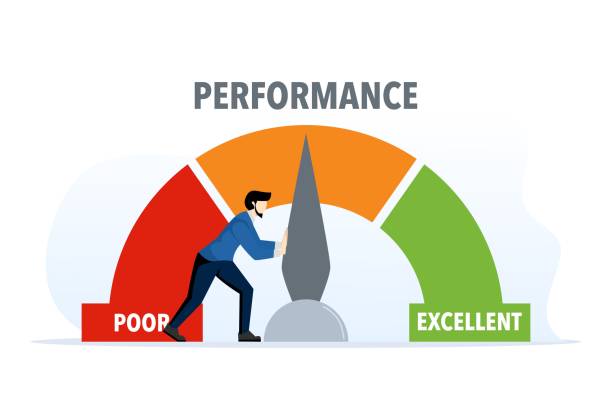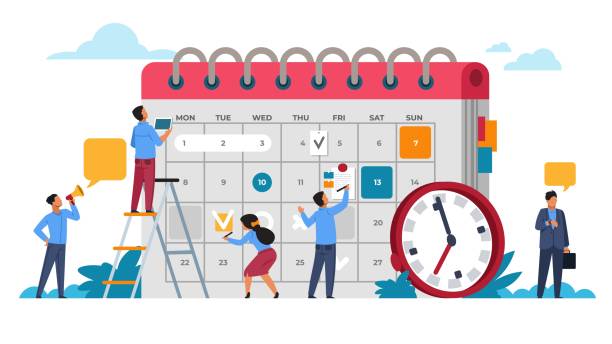For ICAG students, mastering time management and goal setting is like finding the perfect rhythm in a high-stakes dance. This article dives deep into practical strategies to help you juggle rigorous studies, exam prep, and personal life while keeping your eyes on the prize: a thriving accounting career. It builds on the foundation laid by Goal Setting for Academic and Career Success, which explores how to craft SMART goals, align personal and professional aspirations, and boost confidence through structured planning. Here, we zoom in on blending time management with goal setting to maximize productivity and achieve academic excellence. Let’s get started!
Why Time Management and Goal Setting Go Hand in Hand
Balancing the demanding ICAG curriculum with life’s many curveballs isn’t easy. You’ve got lectures, study sessions, maybe a part-time job, and—oh yeah—a social life to squeeze in. Without a solid grip on time management and goal setting, it’s like trying to herd cats while riding a unicycle. These two skills are inseparable because they feed off each other. Goals give you direction, like a North Star, while time management ensures you’re actually moving toward it, step by step.
Think of it this way: setting a goal to ace your ICAG exams is great, but without a plan to carve out study hours, review past papers, and still get some sleep, that goal’s just a pipe dream. According to a study by the University of Georgia, students who combine clear goals with structured time management are 60% more likely to achieve academic success. For ICAG students, this means breaking down your syllabus into bite-sized chunks and scheduling them strategically.
Crafting Clear Goals to Guide Your Time
Setting SMART Goals for ICAG Success
Let’s talk goals—specifically, SMART ones. That’s Specific, Measurable, Achievable, Relevant, and Time-bound, for the uninitiated. For ICAG students, a SMART goal might look like this: “I’ll complete three chapters of Financial Accounting by next Friday, spending two hours daily after dinner.” It’s clear, trackable, and tied to a deadline. This approach, championed by MindTools, keeps you focused and prevents overwhelm.
Start by mapping out your ICAG exam timeline. Break down each subject into topics, then assign them to specific weeks. For example, if you’re tackling Taxation, you might dedicate Week 1 to VAT and Week 2 to Corporate Tax. By setting these mini-goals, you’re not just winging it—you’re building a roadmap that makes time management a breeze.
Aligning Goals with Your Study Schedule
Here’s where the rubber meets the road. Once you’ve got your goals, align them with your daily schedule. Use a planner or digital tools like Google Calendar to block out study sessions. Be realistic—cramming eight hours of auditing after a full day’s work is a recipe for burnout. Instead, aim for focused, distraction-free blocks of 90 minutes, with short breaks to recharge.
Pro tip: prioritize high-impact tasks. If Management Accounting is your weak spot, schedule it for your peak focus hours, like early mornings. This aligns with the Pareto Principle, which suggests 20% of your efforts (like targeted study) yield 80% of your results. By syncing goals with your schedule, you’re not just managing time—you’re owning it.
Practical Time Management Strategies for ICAG Students

Prioritizing Tasks with the Eisenhower Matrix
Ever feel like you’re drowning in to-do lists? The Eisenhower Matrix can be your lifeline. Popularized by Forbes, this tool sorts tasks into four quadrants: urgent and important (do now), important but not urgent (schedule), urgent but not important (delegate), and neither (ditch). For ICAG students, studying for an upcoming mock exam is urgent and important, while binge-watching a new series? Yeah, that’s a ditch.
Apply this by listing your weekly tasks—say, revising Auditing, attending a lecture, and prepping for a group study. Slot them into the matrix, then tackle or schedule accordingly. This keeps you focused on what moves the needle, like mastering time management and goal setting, instead of getting sidetracked by low-value distractions.
Mastering the Pomodoro Technique
If you struggle to stay focused, the Pomodoro Technique is your new best friend. Developed by Francesco Cirillo, this method involves working for 25 minutes, then taking a 5-minute break. After four “Pomodoros,” take a longer 15–30-minute break. It’s perfect for ICAG students grinding through dense topics like Financial Reporting.
Set a timer, pick a task (say, solving past ICAG questions), and dive in. During breaks, stretch, grab a coffee, or do a quick mindfulness exercise. Apps like Focus@Will can enhance this by providing productivity-boosting music. By breaking study time into manageable chunks, you’re less likely to burn out and more likely to stick to your goals.
Overcoming Common Time Management Challenges
Battling Procrastination Head-On
Let’s be real—procrastination is the thief of time, especially when you’re staring down a mountain of ICAG study material. The trick? Start small. Instead of aiming to “study Auditing,” commit to reading one page. This micro-step, backed by Psychology Today, tricks your brain into action, making it easier to keep going.
Another hack: create a “procrastination-proof” environment. Turn off notifications, use apps like Freedom to block social media, and study in a quiet space. For ICAG students, this means prioritizing time management and goal setting over scrolling through X posts about the latest Ghanaian tax reforms.
Handling Unexpected Disruptions
Life loves throwing curveballs—family emergencies, last-minute work shifts, or even a sudden internet outage. When disruptions hit, flexibility is key. Build buffer time into your schedule, like an extra hour each week for catch-up. If you miss a study session, don’t panic—reprioritize using your Eisenhower Matrix and adjust your goals.
For example, if a family event eats into your Taxation prep, reschedule that session for the weekend and shorten a less urgent task, like organizing notes. This adaptability ensures you stay on track without derailing your time management and goal setting efforts.
Tools and Resources to Boost Productivity

Leveraging Digital Tools for Efficiency
In 2025, technology is a game-changer for ICAG students. Apps like Trello or Notion let you organize goals and track progress with ease. Create a board for each ICAG subject, add tasks (like “Complete Chapter 5 Quiz”), and move them to “Done” as you go. This visual progress, as noted by TechRadar, boosts motivation.
For time tracking, try Toggl to see where your hours are going. If you’re spending too much time on low-value tasks (like perfecting your note formatting), adjust your priorities. These tools make time management and goal setting seamless, letting you focus on what matters: passing those exams.
Tapping into ICAG and Knowsia Resources
Don’t sleep on the resources at your fingertips. The ICAG Library offers journals and past papers to hone your study plan, while Knowsia provides insights on goal setting tailored for students like you. Join ICAG study groups or forums to share time management tips with peers. These networks, often highlighted by ICAG’s Partners in Learning, can spark new ideas and keep you accountable.
Building a Sustainable Routine
Creating a Balanced Study Schedule
A killer study routine isn’t about grinding 24/7—it’s about balance. Aim for a mix of study, rest, and personal time. For instance, schedule three 90-minute study blocks daily, with breaks for meals, exercise, or a quick chat with friends. This aligns with research from Harvard Business Review, which shows balanced routines boost long-term productivity.
Include downtime to avoid burnout. Maybe Saturday evenings are for unwinding with a movie or catching up with family. By weaving time management and goal setting into a sustainable routine, you’re setting yourself up for success without sacrificing your well-being.
Reviewing and Adjusting Your Plan
Here’s a truth bomb: no plan is perfect. Life changes, and so should your approach. At the end of each week, review your progress. Did you hit your goal of finishing two Auditing chapters? If not, why? Maybe you overestimated your capacity or got distracted. Adjust by scaling back or tweaking your schedule.
Use a journal or app to log what worked and what didn’t. This reflection, endorsed by Inc., helps refine your time management and goal setting skills, making you more efficient over time.
Staying Motivated to Stick to Your Goals
Motivation isn’t a constant—it ebbs and flows. To keep it high, celebrate small wins. Finished a tough Taxation chapter? Treat yourself to a favorite snack. Visualizing success also helps. Picture yourself passing your ICAG exams or landing that dream accounting job. This mental boost, backed by Forbes, keeps you driven.
Connect with peers for accountability. Share your goals with a study buddy or join a Knowsia forum to swap tips. When you’re tempted to slack off, knowing someone’s in your corner can make all the difference.
Wrapping It Up: Your Path to ICAG Success
Mastering time management and goal setting is like unlocking a superpower for ICAG students. By setting SMART goals, prioritizing tasks, and using tools like the Pomodoro Technique and Eisenhower Matrix, you can tackle your studies with confidence. Embrace flexibility, leverage resources like Knowsia, and build a balanced routine to stay on track. Sure, procrastination and disruptions will test you, but with the right strategies, you’ll come out on top. So, grab your planner, set those goals, and let’s make your ICAG journey a success!

